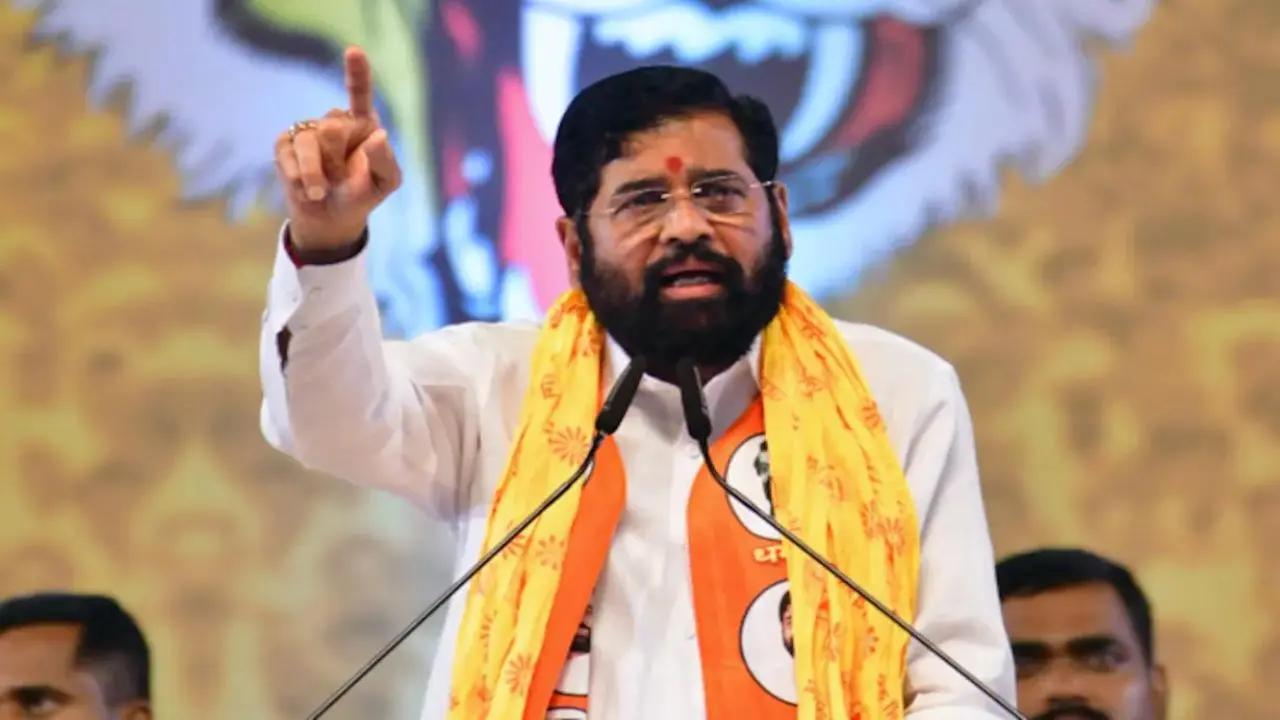Eknath Shinde’s Shiv Sena faction has outperformed Uddhav Thackeray’s camp in the Maharashtra elections, as the Mahayuti alliance leads in over 200 seats, securing a historic victory and reshaping the state’s political landscape

File Pic
The Maharashtra Assembly elections have delivered a resounding victory for the BJP-led Mahayuti alliance, with Chief Minister Eknath Shinde emerging as a dominant force in the state’s political landscape. Leading in over 204 of the 288 constituencies, the alliance appears set to retain power, while the opposition Maha Vikas Aghadi (MVA) struggles to stay afloat with leads in just 47 seats, according to the Election Commission’s latest updates.
ADVERTISEMENT
Shinde’s Shiv Sena faction has significantly outpaced Uddhav Thackeray’s camp, with trends showing his party leading in 55 constituencies compared to Uddhav’s 20. Despite being early results, the numbers suggest that Shinde has solidified his claim as the leader of the “real Shiv Sena,” further bolstering his position as a political heavyweight.
Decisive blow to Uddhav
For Uddhav Thackeray, this election was more than just a political contest — it was a battle to secure his faction’s claim to the Shiv Sena’s legacy. However, Shinde’s faction has outperformed Uddhav’s Shiv Sena (UBT) with an impressive strike rate, contesting only 80 seats and gaining a substantial lead. In contrast, Uddhav’s group fielded candidates in 92 constituencies but has failed to match Shinde’s dominance.
This assembly election outcome follows a similar pattern seen in the Lok Sabha polls earlier this year, where Shinde’s Sena won 7 out of 15 contested seats, outperforming Uddhav’s 9 wins from 21 constituencies. The latest trends reinforce Shinde’s position as the custodian of the Shiv Sena’s ideological core, while Uddhav’s dependence on MVA allies appears to have alienated the party’s traditional voter base.
Winning the grassroots battle
Throughout the campaign, Shinde cast himself as the leader supported by the “true Shiv Sainiks.” His rallies frequently underscored his faction’s connection to the Sena’s grassroots ideology, which he claimed had been diluted under Uddhav’s leadership.
In a notable rally at Vaijapur, Shinde derided Uddhav’s “flaming torch” election symbol, calling it a force of division. “They call it revolutionary, but it only sets homes ablaze,” Shinde said, painting his rival as out of touch with the party’s foundational principles. Shinde’s commitment to protecting the Sena’s Hindutva roots and appealing to its traditional voter base resonated strongly with the electorate, cementing his dominance.
Mahayuti’s historic performance
The Mahayuti alliance, comprising the BJP, Shinde’s Shiv Sena, and Ajit Pawar’s NCP faction, is poised for a historic victory. The BJP has led the charge, dominating in over 120 constituencies — a significant improvement from its 2019 tally of 105 seats. Meanwhile, Ajit Pawar’s faction has shown marked progress, leading in 35 seats and outperforming its dismal Lok Sabha performance earlier this year, when it secured just one seat.
This formidable alliance has left the opposition MVA, a coalition of Uddhav’s Shiv Sena, Congress, and Sharad Pawar’s NCP, trailing far behind. With leads in only about 70 constituencies, the MVA has struggled to mount a credible challenge.
Eknath Shinde’s triumph in this election is not just a personal victory but a turning point in Maharashtra’s political narrative. By outperforming his rivals and consolidating his party’s grassroots base, Shinde has claimed the mantle of the Shiv Sena’s true heir, leaving Uddhav’s faction to confront its existential crisis.
As the BJP-led Mahayuti alliance secures a historic win, Maharashtra’s political landscape has undergone a seismic shift, with Shinde firmly entrenched as a leader of both conviction and consequence.
 Subscribe today by clicking the link and stay updated with the latest news!" Click here!
Subscribe today by clicking the link and stay updated with the latest news!" Click here!







